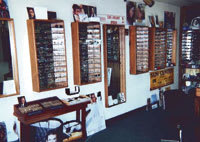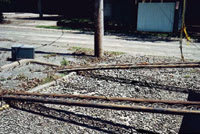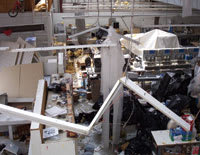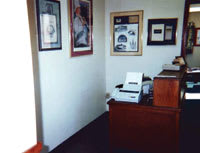feature
Before and After
After
Hurricane Katrina ruined their facilities and put a damper on their
businesses, these intrepid eyecare professionals got mad and got even. Here's
how they came back
By Karlen
McLean, ABOC, NCLC
|
|
|
|
| Esplanade Optical rebuilt in the aftermath of Katrina. Below: Before and after the storm |
When the flood generated from Hurricane Katrina hit Esplanade Optical in Metairie, La., owner and Opticians Association of America president Elmo Spellman, ABOC, was prepared.
"We boarded up the store and lifted as much as we were able to high enough to avoid the flood," he says. "We were able to save our records and inventory."
But there was lots of clean up work to do and, considering the damage, he debated retiring or repairing. "I didn't want Katrina to put us out of business, and I had two more years before I wanted to retire."
BACK IN BUSINESS
Storing fixtures for four months, Esplanade reorganized and opened a new location nearby. Metal objects rusted, including displays and lab equipment, which required replacement. What didn't get replaced, "a little WD-40 helped fix," he quips.
The greatest challenge Spellman and his staff faced was reconnecting with customers. Each person made calls in 50-household increments. They also ran ads in local publications on their availability for eyecare.
"We had a lot of people who needed new eyewear due to loss, breakage, and scratching, and many needed eye exams. An optometrist joined us for two days a week. He plans on working with us until he gets his business rebuilt and probably afterward," Spellman says.
|
|
|
|

|
| Top to bottom: The wreckage at Esplanade Optical; the roof at Superior Optical was torn off; hurricane wind and a tornado hit the lab |
The long-term effects are still unknown. "We don't know who's returning and who's not returning. We can't project what business will be like in the near future. So we're watchful of our budget," he says.
After Hurricane Katrina, Optical Distributors, Inc., in Jackson, Miss., lost power for a week, president Leonard Farmer notes, adding that even being on the fringe of the storm had many challenges.
"Being out of power for a week hurt our business for that week, but also perhaps beyond. Several of our customers got mad that we couldn't supply them with what they needed during that time," he says.
SLOW AND STEADY
For Superior Optical Labs, Inc., in Ocean Springs, Miss., recovery was no small task. The independent wholesale lab lost almost everything—the roof, inventory, and jobs were scattered, resulting in nearly $1 million in damage.
"We had 678 jobs in progress. We usually secure jobs by taking them out of the lab into a protected container," says vice president Jonathan Jacobs.
"Because
of all the hurricanes we had prepared for over the last year, we experienced 'hurricane
fatigue' and overlooked this procedure. I learned to never let that
happen again,"
he notes.
It took eight months for Superior to reopen. One of the main challenges was finding alternatives for customers without losing them. The business has had about a 50/50 success rate.
His advice to those in hurricane-prone areas: "Locate in buildings that are up to current building codes. Make sure they're metal construction and make sure they're on high ground. And always be well insured."
Playing it safe
In the case of any disaster, the difference between coming back and closing up may be solid insurance coverage.
Elmo Spellman, ABOC, the owner of Esplanade Optical in Metairie, La., advocates being well insured.
"There's not much you can do about a natural disaster. You have to accept the loss of things you can't save. Get insurance, then get more insurance."
|
|

|
|
Before and after pictures at Esplanade Optical shows the high water lines from storm flooding |
|
Jonathan Jacobs, vice president of Superior Optical Labs in Ocean Springs, Miss., mentions, "We didn't have enough insurance. I learned from this experience to have more insurance, and to read and understand the small print."
Insurance expert Debbie Sledge of Grona Boles and Martin Insurance in San Antonio outlines some basic insurance facts:
1. Business location determines the appropriate coverage. Business income insurance is based on gross sales.
2. Specialty markets like coastal locations are usually required to purchase separate wind/hail/flood policies, as these coverage points may be excluded from standard insurance policies in areas with more peril.
3. Property should be insured for replacement cost value for building and contents to be repaired/replaced at today's values.
4. Business interruption insurance and extra expense coverage helps offset loss of income and defray extra costs.
Work with a local insurance agent who can help develop an insurance program suitable for the needs of the business and insure for perils that are unique to certain areas such as hurricanes, flooding, and earthquakes.








